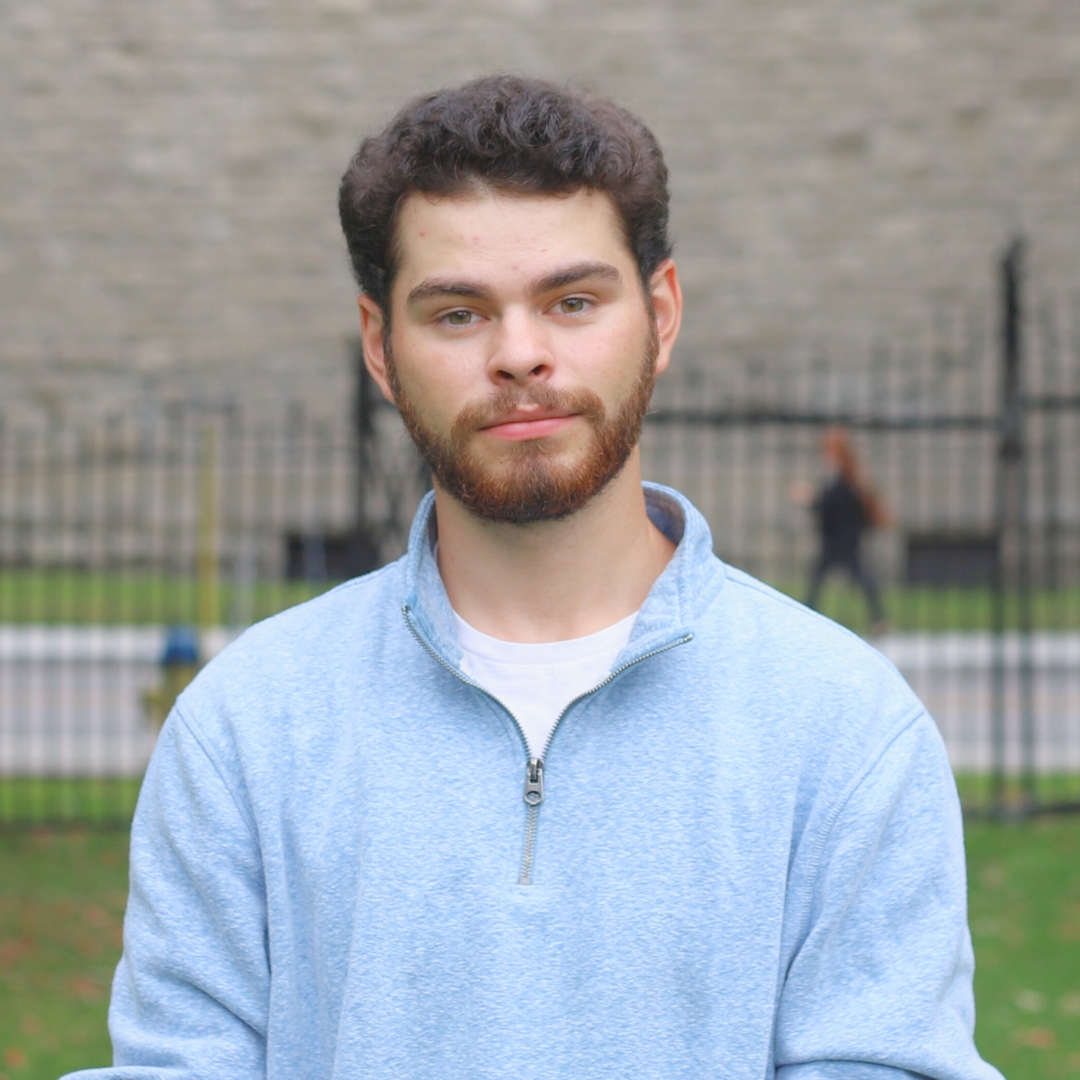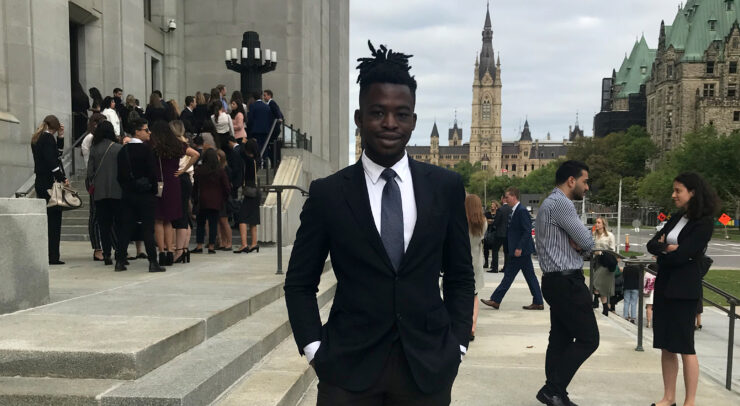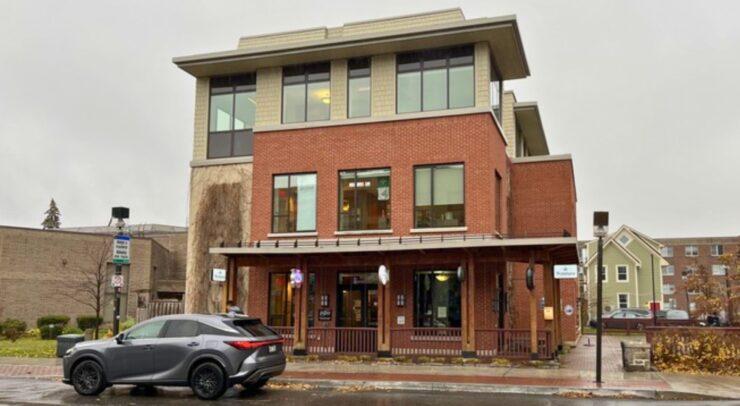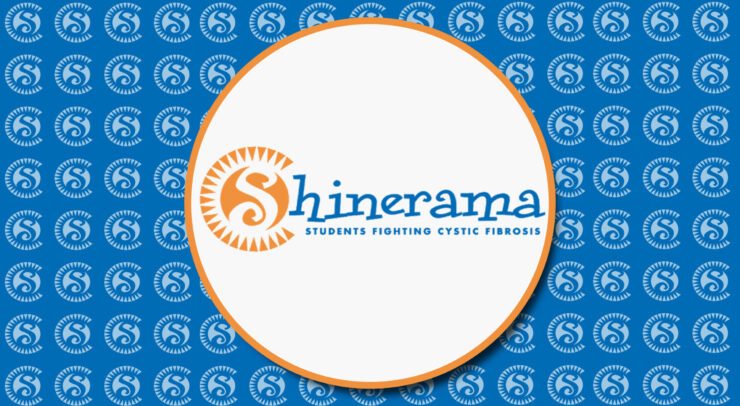Gruz sanctioned by chief electoral officer following social media post
Editor’s Note: the vote percentages for candidates are calculated with abstentions included in the denominator.
U of O students flocked to the polls last week in their largest numbers since 2020 (10.63 per cent voter turnout) to have their say in the University of Ottawa Students’ Union (UOSU) general elections. In the first contested presidential race since the 2023 by-elections, Jack Coen was decisively elected as the union’s next leader (55.8 per cent) over Suzanne Gruz (31.2 per cent).
Gruz was sanctioned by chief electoral officer Ben Cameron after Cameron received complaints about a private Instagram story Gruz posted following the Fulcrum and La Rotonde debate on Monday night.
Cameron found that Gruz “violated sections 6.1.2 and 6.1.6 of the Code by bullying and being disrespectful towards [Coen].” She was ordered to post a public apology and halt all public campaigning from Wednesday at 4:00 p.m. to Friday at 11:59 p.m.
For the position of Francophone affairs commissioner, a photo finish was needed. In that race, fourth-year communications and sociology student Ève Tremblay just slightly edged out second-year political science and public administration student Yuktha Kowlessur, gaining 1547 votes (38.6 per cent) to Kowlessur’s 1502 (37.5 per cent).
After two executive candidates were disqualified for unsatisfactory language testing, just one other executive candidate remained on the ballot — the incumbent Alex Stratas, to keep her position of advocacy commissioner. Stratas gained a stronger mandate than her initial election at the fall by-elections, securing 72.4 per cent of the vote.
All executive candidates will take office on May 1. For the vacant positions (communications, student life, and operations) UOSU can hire interim commissioners to begin work on that date. The process to dissolve the position of equity commissioner and transfer its portfolio to other positions was started before Christmas. Three out of the past four equity commissioners have resigned or been impeached before the end of their terms.
Referendum Questions
There were seven referendum questions on the ballot this year — six asking students to pay more fees. Four were engineering specific, with all but one of the four failing.
The first, renaming the “Engineering Students’ Society” ancillary fee to the “Engineering Endowment Fund” ancillary fee passed with 53.4 per cent, but the other three: increasing the $25 ancillary fee alongside the Consumer Price Index yearly, extending the fee to computer science students, and introducing a $5 dollar fee for students to fund Hack the Hill through the Capital Technology Network did not.
The $5 fee which would go towards the Capital Technology Network (CTN), a non-profit which hosts Hack the Hill annually, was subject to much online controversy, leading CTN to host an information session on Feb. 3. Students voted resoundingly (89.7 per cent) against the proposed fee.
Two more referendum questions passed. A $3 dollar per semester (inflation-adjusted) levy named the “Fund For Students With Disabilities” to fund initiatives of the future Accessibility Caucus at the U of O had 56.4 per cent approval, and a $1.50 semester levy per student for the purposes of the Advocacy Fund had 53.1 per cent approval.
The future of a proposed Francophone Centre, part of Coen’s platform, is in doubt after a $1.50 per semester Francophonie Ancillary fee failed with 34.9 per cent approval. The referendum question noted the fee “could” be used for a new Francophone Centre, pending approval by the union’s services committee.
The Board of Directors, Board of Governors, and Senate
10 students were elected to the union’s Board of Directors (BOD). The executive committee also holds seats on the BOD.
Jean-Paul Azzi (82.3 per cent, faculty of medicine), Grace Tongue (71.8 per cent, faculty of health sciences), Julianne Leblanc (75.3 per cent, faculty of arts), Zach Lebel (57.9 per cent, faculty of science), and Matias Suxo Salinas (56.8 per cent, engineering) were all elected unopposed. Daniel Thorp (28.7 per cent, engineering) was not elected, meaning just one of the three available seats for engineering students was filled.
The faculty of social sciences saw nine candidates vying for election. Through ranked ballot, five remained: Ryan Chang, Marème Diongue, Lien Huynh, Eyinojuoluwa Orolugba, and Eli Zima Luste.
UOSU also organizes elections for the University of Ottawa’s Board of Governors (BOG) and Senate. Two students hold seats on the BOG, which manages the university’s finances, policies, and procedures. These students are exempt from paying tuition while they serve a two-year term on the board. Hazel Downey outlasted five other students vying for the single position available this election.
Four students were elected to the U of O’s Senate, which sets academic policies. Each faculty holds one seat on the senate. Two candidates were elected unopposed: Luca Piomelli (66.0 per cent, faculty of arts) and Bowen Ivanovich (28.4 per cent, engineering). 56.4 per cent of engineering students who voted abstained on Ivanovich.
Fred Clovis Rugira was elected for the health sciences seat with 51.8 per cent of the vote to Meena Mosa’s 29.1 per cent, while Jérémie Gorman defeated three candidates via ranked ballot in the faculty of social sciences.
What’s Next?
All candidates still have to be ratified at a UOSU board meeting and then the union’s Winter General Assembly (WGA) which will take place on Sunday, March 16. Following ratifications, they will take office on May 1.
Coen, who took a leave of absence as UOSU chief of staff and deputy to the president during the election period, spoke to the Fulcrum following his win, and thanked everyone who ran, saying “campus community is stronger and more engaged in student democracy because of you.”
“I’d especially like to congratulate Suzanne on an incredible campaign,” continued the third-year political science student. “I look forward to working with her again to keep pushing [UOSU] forward on the issues that matter most to our members: campus safety, rebuilding student life, supporting students through hardship, and more.”
Before UOSU, Coen began volunteering in federal politics at 17 and ended up spending more than two years working as a federal political staffer. “To everyone who supported my campaign — whether you volunteered, voted, or were convinced by a roommate — thank you. I’ll work as hard as I can over the next year to earn the trust you’ve placed in me.”






